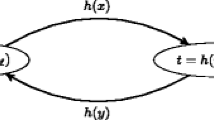Abstract
In this paper we define and study super complexity cores of languages L with respect to classes C with L ∉ C. A super complexity core S of L can be considered as an infinite set of strings for which the decision problem for L is very hard to solve with respect to the available “resources” fixed by C even for algorithms which have to compute the correct result only for all inputs x ε S. For example let C = P and S be a super complexity core of L. Then S is infinite and all deterministic Turing machines M, which output 1 on input x ε S ∩ L and O on input x ε S ∩ Pit¯tL, need more than polynomially many steps on all but finitely many inputs x ε S. We prove that for all non-empty, countable classes of languages C which are closed under finite variation, finite union, and under complement and for all languages L ∉ C it follows that such a super complexity core of L with respect to C exists. Moreover we show: Given a recursively enumerable class C of languages and a recursive language L, if there is a super complexity core of L with respect to C, then there exists a recursive super complexity core, too.
Thus for L ∉ BPP (PP, PSPACE,...) there exists a set S such that all BPP Turing machines (PP Turing machines, PSPACE Turing machines,...), which compute the characteristic function of L correctly at least on inputs x ε S, need more than polynomially many steps (tape cells) on almost all inputs x ε S.
Preparation of this paper was supported in part by a fellowship of the Graduiertenkolleg Informatik (Deutsche Forschungsgemeinschaft).
Preview
Unable to display preview. Download preview PDF.
Similar content being viewed by others
References
José Balcazár and Uwe Schöning. Bi-immune sets for complexity classes. Mathematical System Theory, 18:1–10, 1985.
Ingrid Biehl. Eine Grundlegung der Average-Case Komplexitätstheorie. PhD thesis, Department of Computer Science, Universität des Saarlandes, 1993.
Ronald V. Book and Ding-Zhu Du. The existence and density of generalized complexity cores. Journal of the Association for Computing Machinery, 34(3):718–730, Juli 1987.
Ronald V. Book and Ding-Zhu Du. The structure of generalized complexity cores. Theoretical Computer Science, 61:103–119, 1988.
Ronald V. Book, Ding-Zhu Du, and David Russo. On polynomial and generalized complexity cores. In Proc. of the 3rd IEEE Conference on Structure in Complexity Theory, pages 236–250, 1988.
Author information
Authors and Affiliations
Editor information
Rights and permissions
Copyright information
© 1994 Springer-Verlag Berlin Heidelberg
About this paper
Cite this paper
Biehl, I. (1994). Definition and existence of super complexity cores. In: Du, DZ., Zhang, XS. (eds) Algorithms and Computation. ISAAC 1994. Lecture Notes in Computer Science, vol 834. Springer, Berlin, Heidelberg. https://doi.org/10.1007/3-540-58325-4_228
Download citation
DOI: https://doi.org/10.1007/3-540-58325-4_228
Published:
Publisher Name: Springer, Berlin, Heidelberg
Print ISBN: 978-3-540-58325-7
Online ISBN: 978-3-540-48653-4
eBook Packages: Springer Book Archive




